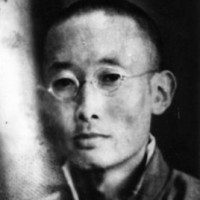One may think: “We concede that our decisions are unreliable, but when we follow the decisions of the Buddha, we are infallible.” Then who decided that the Buddha is infallible? If you say, “The great scholars and adepts like Nagarjuna decided that he is infallible,” then who decided that Nagarjuna is infallible? If you say, “The Foremost Lama Tsong khapa decided it,” then who knows that the Foremost Lama is infallible? If you say, “Our kind and peerless lama, the excellent and great so and so decided,” then infallibility, which depends on your excellent lama, is decided by your own mind. In fact, therefore, it is a tiger who vouches for a lion, it is a yak who vouches for a tiger, it is a dog who vouches for a yak, it is a mouse who vouches for a dog, it is an insect who vouches for a mouse. Thus, an insect is made the final voucher for them all. Therefore, when one analyzes in detail the final basis for any decision, apart from coming back to one’s own mind, nothing else whatsoever is perceived.

Gendun Choepel
Adornment for Nagarjuna’s Thought, verse 9
from the book
translated by Donald Lopez
Read a random quote or see all quotes by Gendun Choepel.